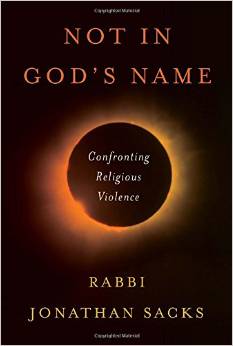By MARTHA MINOW
Review of Not in God's Name: Confronting Religious Violence, by Jonathan Sacks
Schocken, 2015
This is a courageous and imaginative book by the former Chief Rabbi of the United Hebrew Congregations of the Commonwealth (formerly, the British Commonwealth). He develops the notion of "altruistic evil" to refer to violence committed "in a sacred cause, in the name of high ideals," and calls it the biggest threat to freedom in our time. Exploring terrible violence committed in the name of religious beliefs, he argues that a particular mindset ("pathological dualism") is to blame, traces its appearance across otherwise diverging religious traditions, and identifies interpretations of religious narratives giving rise to violence between and among Jewish, Christian, and Muslim believers. Constructively, he draws on interpretive resources within the traditions to point toward solutions.
The analysis builds on the Prisoners' Dilemma, showing the critical importance of trust to learning to treat others as one would want to be treated. The dangerous mindset working against reciprocal respect is "pathological dualism," dividing humanity into good and evil--and between "we" and "they." This mindset fuels scapegoating, rivalries, and genocides. Religious belief in the oneness and goodness of divinity give way to dualism. Identity groups entrench the sense of "we" and "they." Working against such divisions are the conceptions of a singular God, universal reason, and individualism that animated religious pluralism, the Enlightenment, and Western political theory. But tribalism prevails. Dualism obscures religious sources highlighting how even the best people are not perfect and even the worst are not irredeemable.
The book emphasizes the importance of locating good and bad within each person and group. It highlights the commitments in each of the three Abrahamic religions to both universal justice and particularized love. Each of the traditions also models how to relinquish hatred through forgiveness and how to orient toward the future rather than the past. But since religious beliefs can so often be overtaken by pathological dualism, and the very fact of religious differences can give rise to "we"/" they" thinking, more than religious arguments are needed. Although a minor theme, the book usefully urges vigorous political and legal defense of freedom of religion alongside campaigns against the teaching and preaching of hatred. It emphasizes that wars are won with weapons but peace is won with ideas. Honest about the risk that any religion can be hijacked by hatred, Rabbi Sacks criticizes all who kill in the name of religion and offers psychological, theological, historical, and philosophic resources to resist the temptations of hatred.
Posted on 26 October 2015
MARTHA MINOW is the Morgan and Helen Chu Dean and Professor of Law at Harvard Law School. Her most recent book is The First Global Prosecutor: Promise and Constraints (University of Michigan Press, 2015), co-edited with Cora True-Frost and Alex Whiting.

